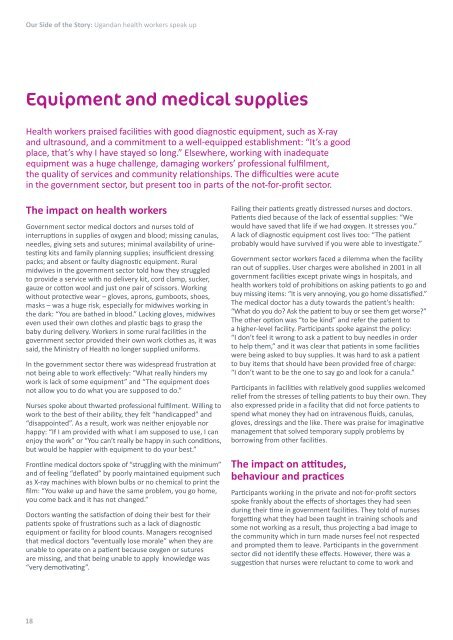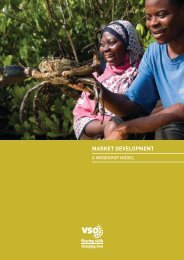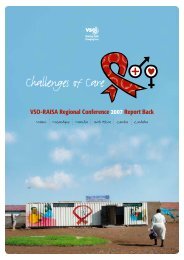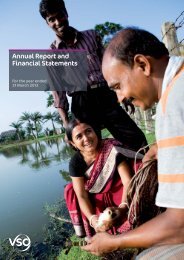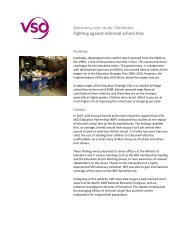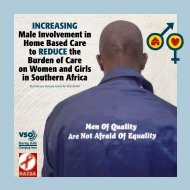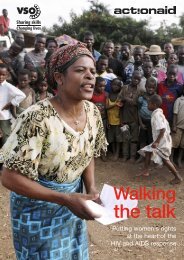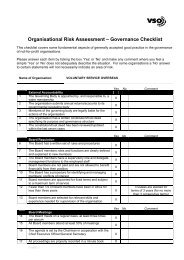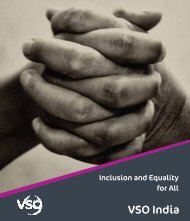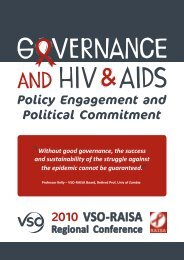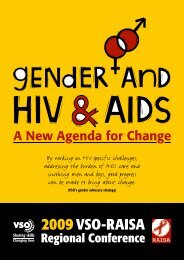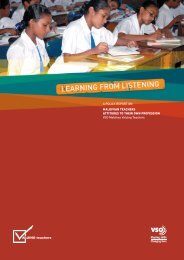Our Side of the Story - Ugandan health workers speak up - VSO
Our Side of the Story - Ugandan health workers speak up - VSO
Our Side of the Story - Ugandan health workers speak up - VSO
You also want an ePaper? Increase the reach of your titles
YUMPU automatically turns print PDFs into web optimized ePapers that Google loves.
<strong>Our</strong> <strong>Side</strong> <strong>of</strong> <strong>the</strong> <strong>Story</strong>: <strong>Ugandan</strong> <strong>health</strong> <strong>workers</strong> <strong>speak</strong> <strong>up</strong><br />
Equipment and medical s<strong>up</strong>plies<br />
Health <strong>workers</strong> praised facilities with good diagnostic equipment, such as X-ray<br />
and ultrasound, and a commitment to a well-equipped establishment: “It’s a good<br />
place, that’s why I have stayed so long.” Elsewhere, working with inadequate<br />
equipment was a huge challenge, damaging <strong>workers</strong>’ pr<strong>of</strong>essional fulfilment,<br />
<strong>the</strong> quality <strong>of</strong> services and community relationships. The difficulties were acute<br />
in <strong>the</strong> government sector, but present too in parts <strong>of</strong> <strong>the</strong> not-for-pr<strong>of</strong>it sector.<br />
The impact on <strong>health</strong> <strong>workers</strong><br />
Government sector medical doctors and nurses told <strong>of</strong><br />
interr<strong>up</strong>tions in s<strong>up</strong>plies <strong>of</strong> oxygen and blood; missing canulas,<br />
needles, giving sets and sutures; minimal availability <strong>of</strong> urinetesting<br />
kits and family planning s<strong>up</strong>plies; insufficient dressing<br />
packs; and absent or faulty diagnostic equipment. Rural<br />
midwives in <strong>the</strong> government sector told how <strong>the</strong>y struggled<br />
to provide a service with no delivery kit, cord clamp, sucker,<br />
gauze or cotton wool and just one pair <strong>of</strong> scissors. Working<br />
without protective wear – gloves, aprons, gumboots, shoes,<br />
masks – was a huge risk, especially for midwives working in<br />
<strong>the</strong> dark: “You are ba<strong>the</strong>d in blood.” Lacking gloves, midwives<br />
even used <strong>the</strong>ir own clo<strong>the</strong>s and plastic bags to grasp <strong>the</strong><br />
baby during delivery. Workers in some rural facilities in <strong>the</strong><br />
government sector provided <strong>the</strong>ir own work clo<strong>the</strong>s as, it was<br />
said, <strong>the</strong> Ministry <strong>of</strong> Health no longer s<strong>up</strong>plied uniforms.<br />
In <strong>the</strong> government sector <strong>the</strong>re was widespread frustration at<br />
not being able to work effectively: “What really hinders my<br />
work is lack <strong>of</strong> some equipment” and “The equipment does<br />
not allow you to do what you are s<strong>up</strong>posed to do.”<br />
Nurses spoke about thwarted pr<strong>of</strong>essional fulfilment. Willing to<br />
work to <strong>the</strong> best <strong>of</strong> <strong>the</strong>ir ability, <strong>the</strong>y felt “handicapped” and<br />
“disappointed”. As a result, work was nei<strong>the</strong>r enjoyable nor<br />
happy: “If I am provided with what I am s<strong>up</strong>posed to use, I can<br />
enjoy <strong>the</strong> work” or “You can’t really be happy in such conditions,<br />
but would be happier with equipment to do your best.”<br />
Frontline medical doctors spoke <strong>of</strong> “struggling with <strong>the</strong> minimum”<br />
and <strong>of</strong> feeling “deflated” by poorly maintained equipment such<br />
as X-ray machines with blown bulbs or no chemical to print <strong>the</strong><br />
film: “You wake <strong>up</strong> and have <strong>the</strong> same problem, you go home,<br />
you come back and it has not changed.”<br />
Doctors wanting <strong>the</strong> satisfaction <strong>of</strong> doing <strong>the</strong>ir best for <strong>the</strong>ir<br />
patients spoke <strong>of</strong> frustrations such as a lack <strong>of</strong> diagnostic<br />
equipment or facility for blood counts. Managers recognised<br />
that medical doctors “eventually lose morale” when <strong>the</strong>y are<br />
unable to operate on a patient because oxygen or sutures<br />
are missing, and that being unable to apply knowledge was<br />
“very demotivating”.<br />
Failing <strong>the</strong>ir patients greatly distressed nurses and doctors.<br />
Patients died because <strong>of</strong> <strong>the</strong> lack <strong>of</strong> essential s<strong>up</strong>plies: “We<br />
would have saved that life if we had oxygen. It stresses you.”<br />
A lack <strong>of</strong> diagnostic equipment cost lives too: “The patient<br />
probably would have survived if you were able to investigate.”<br />
Government sector <strong>workers</strong> faced a dilemma when <strong>the</strong> facility<br />
ran out <strong>of</strong> s<strong>up</strong>plies. User charges were abolished in 2001 in all<br />
government facilities except private wings in hospitals, and<br />
<strong>health</strong> <strong>workers</strong> told <strong>of</strong> prohibitions on asking patients to go and<br />
buy missing items: “It is very annoying, you go home dissatisfied.”<br />
The medical doctor has a duty towards <strong>the</strong> patient’s <strong>health</strong>:<br />
“What do you do Ask <strong>the</strong> patient to buy or see <strong>the</strong>m get worse”<br />
The o<strong>the</strong>r option was “to be kind” and refer <strong>the</strong> patient to<br />
a higher-level facility. Participants spoke against <strong>the</strong> policy:<br />
“I don’t feel it wrong to ask a patient to buy needles in order<br />
to help <strong>the</strong>m,” and it was clear that patients in some facilities<br />
were being asked to buy s<strong>up</strong>plies. It was hard to ask a patient<br />
to buy items that should have been provided free <strong>of</strong> charge:<br />
“I don’t want to be <strong>the</strong> one to say go and look for a canula.”<br />
Participants in facilities with relatively good s<strong>up</strong>plies welcomed<br />
relief from <strong>the</strong> stresses <strong>of</strong> telling patients to buy <strong>the</strong>ir own. They<br />
also expressed pride in a facility that did not force patients to<br />
spend what money <strong>the</strong>y had on intravenous fluids, canulas,<br />
gloves, dressings and <strong>the</strong> like. There was praise for imaginative<br />
management that solved temporary s<strong>up</strong>ply problems by<br />
borrowing from o<strong>the</strong>r facilities.<br />
The impact on attitudes,<br />
behaviour and practices<br />
Participants working in <strong>the</strong> private and not-for-pr<strong>of</strong>it sectors<br />
spoke frankly about <strong>the</strong> effects <strong>of</strong> shortages <strong>the</strong>y had seen<br />
during <strong>the</strong>ir time in government facilities. They told <strong>of</strong> nurses<br />
forgetting what <strong>the</strong>y had been taught in training schools and<br />
some not working as a result, thus projecting a bad image to<br />
<strong>the</strong> community which in turn made nurses feel not respected<br />
and prompted <strong>the</strong>m to leave. Participants in <strong>the</strong> government<br />
sector did not identify <strong>the</strong>se effects. However, <strong>the</strong>re was a<br />
suggestion that nurses were reluctant to come to work and<br />
18


